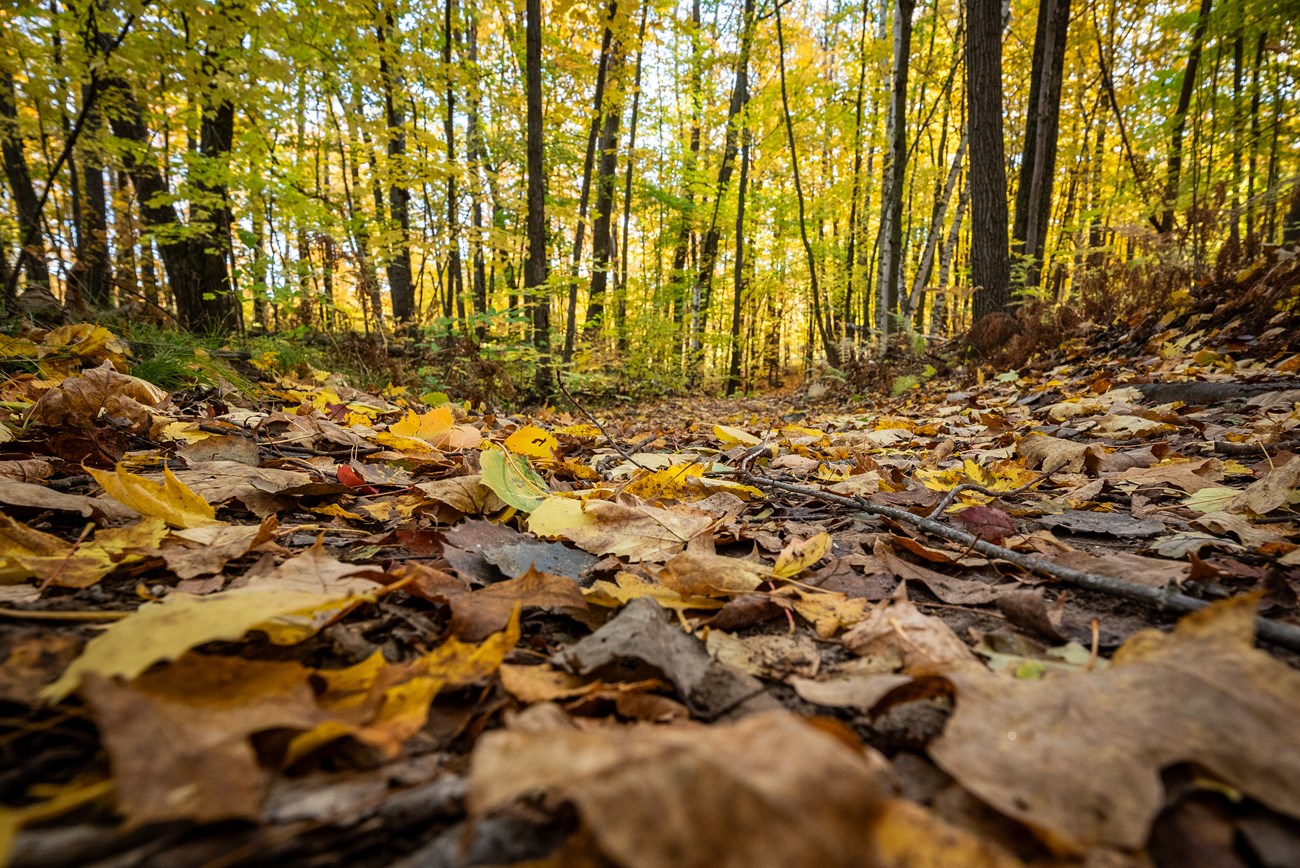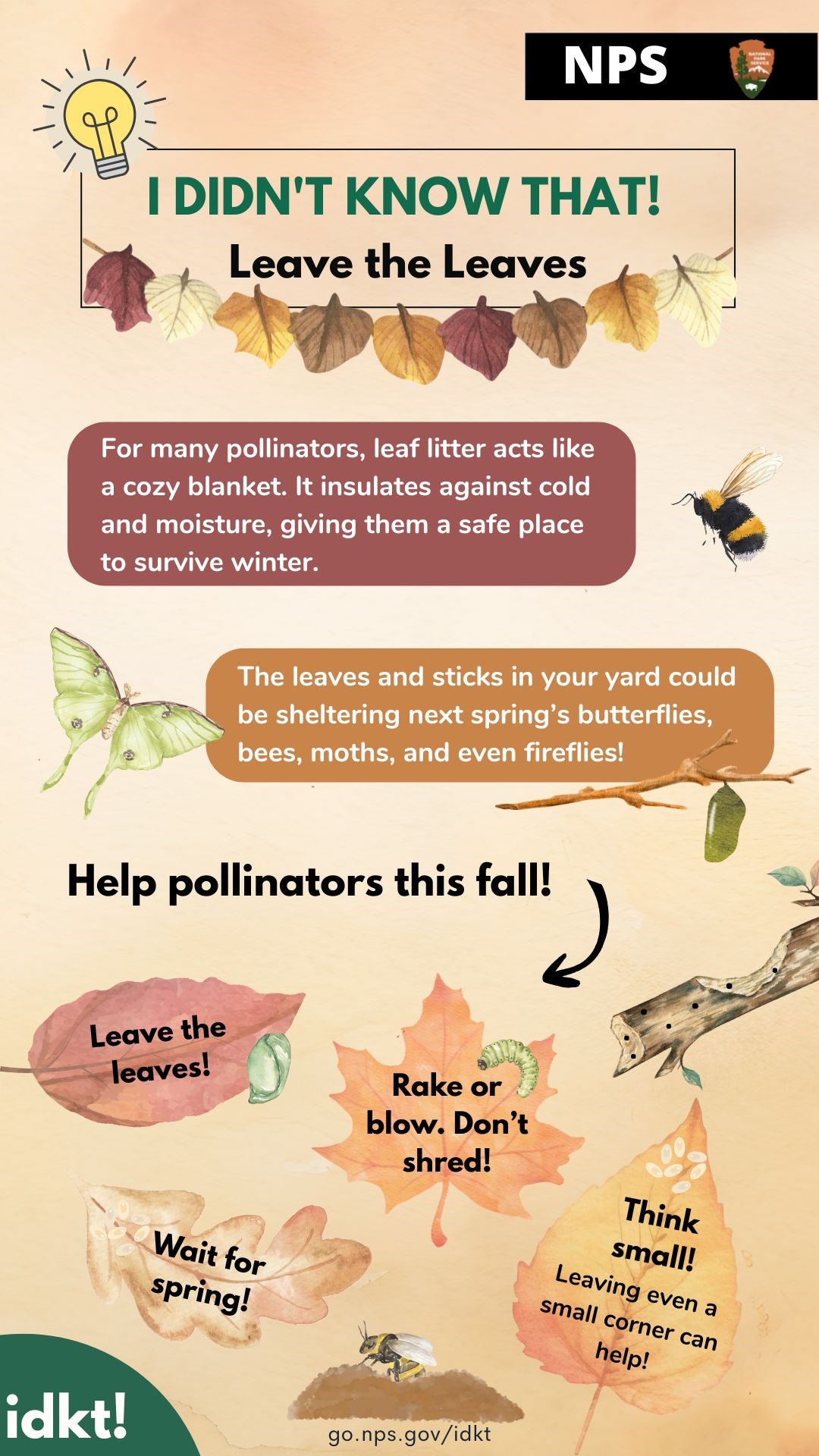Last updated: September 19, 2025
Article
I Didn't Know That!: Leave the Leaves


NPS / Billy Flynn
A cozy blanket for pollinators
For many insects, leaf litter acts like a cozy blanket. It insulates against cold and moisture, giving them a safe place to survive the winter. Bees, butterflies, and moths all take shelter in ways you might not expect:
Bees in the ground: Many bumble bees, sweat bees, and mining bees dig down into soil and rely on leaf cover for insulation.
Bees in stems: Most small carpenter bees, mason bees, and leafcutter bees nest inside hollow or pithy plant stems, sometimes sealing themselves in until spring.
Butterflies and moths: Many species overwinter as chrysalises, cocoons, caterpillars or eggs tucked among leaves, stems, or twigs, quietly waiting until warmer days.
Why it matters
Pollinators are key to healthy ecosystems, including the ones you visit in national parks. They help plants flower, seed, and provide food for other animals (even us!). By leaving the leaves, you’re helping protect the next generation of pollinators that parks (and your own backyard) depend on.

NPS / Christina Martin
What you can do
Leave the leaves: Instead of bagging them up, let them stay as overwintering habitat for pollinators!
Or move them just a bit: You don’t have to leave the leaves where they fall to help pollinators. You can do a little clean up and move the leaves to garden beds or around tree bases.
Rake or blow. Don’t shred: Instead of using your mower to collect and shred leaves, use a rake or a blower and keep the leaves intact. This provides better habitat for pollinators and keeps you from accidentally destroying eggs, caterpillars, and cocoons already on or within the leaves. Leaf-eating bugs will help by eating and breaking up leaves as they decompose.
Skip the yard “cleanup”: Hollow stems and twigs might be hiding sleeping bees. Instead of disposing or burning pieces of wood, create a brush pile for pollinators! Looking for a “clean” look? You can hide the pile behind existing landscaping or use the larger pieces as borders to define the edges of your planters!
Think small: Even leaving just a corner of your yard untouched can make a big difference for pollinators.
Wait for spring: You’re not procrastinating, you’re helping pollinators! Instead of cutting back plants and cleaning up your yard in the fall, wait until spring is underway. This will give pollinators a winter home and allow them to emerge before your spring cleaning.
So next time you hear that satisfying crunch underfoot, remember, you might be stepping over a pollinator’s winter hideaway. By leaving the leaves, you’re giving nature a helping hand until spring.

Pass it on
Did you learn something new? Pass it on! Protecting our ecosystems is a job for us all, but there’s no way for everyone to be an expert in everything. That’s why sharing knowledge is so important! So next time you see a neighbor raking up their leaves, let them know that leaving the leaves can help the pollinators in their own backyard!
Download or screenshot this card to share with a friend or help you remember to leave the leaves. Thank you for helping protect pollinators!
Check out other I Didn’t Know That! topics.
- For many pollinators, leaf little acts like a cozy blanket. It insulates against cold and moisturem giving them a safe place to survive winter.
- The leaves and sticks in your yard could be sheltering next spring's butterflies, bees, moths, and even fireflies!
- Help pollinators this fall!
- Leave the leaves
- Rake or blow. Don't shred!
- Wait for Spring!
- Think small! Leaving even a small corner can help!
- go.nps.gov/idkt!
